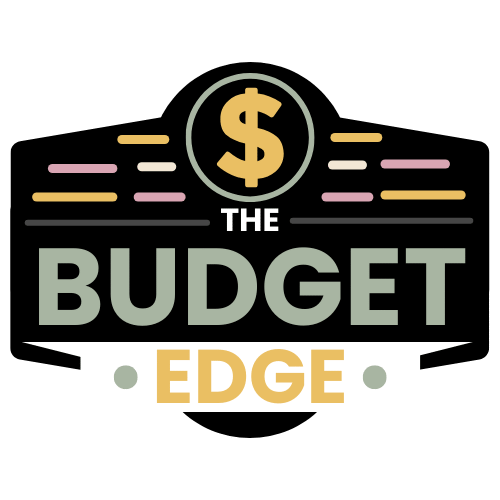
Before the Budget: The Shift That Changed Everything

The Moment I Knew We Needed a Plan
I don’t remember every detail of the moments – or the life – before the budget. But I remember how powerless it felt. I was reactive instead of deliberate. I scrambled when all of the eggs had already left the basket, instead of planning ahead where the eggs should go. And I was hoping instead of knowing. The moment I picked up a notebook and gave every dollar a job? Everything started to change!
The Pin Drop Moment
There we were, going about our daily lives, renting a comfortable, familiar, nothing-fancy apartment. Then, suddenly, everything changed. A sudden and unexpected shift left us scrambling to find a new place to live… with no emergency fund, no backup plan, and honestly, no clue how we were going to make it work.
I realized in that moment how much I’d internalized the idea that “it’ll all work out.” I’d heard it all through my childhood and even said it to myself plenty of times in early adulthood. It sounded comforting – and sometimes things did work out. But not because of planning. More like a patch job made of stress, luck and last-minute talks with the universe.
Standing in the chaos, I finally understood: hoping it’ll all work out isn’t the same as knowing you’ve prepared for moments like this.
What I Thought Budgeting Was
Growing up, the word budget wasn’t just misunderstood – it was almost taboo. It came in with an air of restriction, stress, and even shame. If someone said, “we’re on a budget,” it didn’t sound empowering – it sounded like something had gone wrong.
I wasn’t brought up in a household that had open discussions about money. Credit was never explained. Savings were non-existent. And budgeting? That felt like something people had to do when things got bad, not something you chose to take control of your future.
So, I entered adulthood with this unspoken belief that money talk was uncomfortable, and that budgeting meant going without. I wasn’t avoiding it because I didn’t care – I avoided it because I was never shown what it could be.
It took years to rewire that mindset, and it didn’t start with an app or a spreadsheet (because what even are those, it was 2009?!). It started with one honest look at what wasn’t working.
The Shift
I didn’t have some magical turning point; no financial guru dropped a wisdom bomb in my inbox. No perfect moment of motivation. It was more so a quiet desperation. It started with a pen and a piece of scrap paper, probably the back of a bill envelope. I just started scribbling down what bills were due, what money we expected, and what might be left. That was it. No plan. No color coding. Just an honest list in the middle of panic.
But something shifted. I could see the money – I wasn’t guessing anymore. I knew what was due, what we had and what we didn’t. And oddly, that act of panic brought a strange kind of calm. It didn’t fix anything, but it gave me back something I hadn’t had in a while: a sense of control.
It was messy and imperfect, a little awkward even. But it was mine. And it was a beginning.

The First Wins
That list on the back of a bill envelope didn’t transform anything overnight. But it did something more important: it gave us a starting point.
Once I started writing it down, I noticed things I hadn’t seen before. We weren’t spending on big, flashy things. It was the little things – the “it’s only a coffee” or “just this once” purchases – that added up fast. Seeing the money on paper helped us to start shifting it around more intentionally.
It wasn’t about cutting everything out. It was about spotting habits and making small changes. One less impulse pizza-and-wing night here, a simple meal plan there. Slowly, we were figuring it out.
Then came our first real win! We made it to the end of the month with a little left over. Not a windfall, but just enough to say, “Hey, this is actually working.” It showed us that budgeting didn’t have to be perfect. It just needed our attention.
Those early wins were small, but they started to build on one another. And with those small wins came something we hadn’t felt before – a sense of stability. A sense of knowing we are moving in the right direction.
These Days Look Different
These days (most of them) don’t feel like budgeting is a crisis response. It feels like something we own. It’s not always pretty or perfectly mapped out, and sometimes things sneak up on us, but it works for us. We’ve gone from reacting to planning, even when the numbers are still tight.
We check in with our money instead of letting the universe decide. We talk openly, as a family, about what things cost, why we make certain choices and what goals we want to work toward. We’ve shifted from “I hope this works” to “Here’s the plan.”
Don’t get me wrong, life still throws us a curveball here and there. But we now face them knowing we have a strong foundation underneath us – a habit and a little bit of breathing room.
Looking back, I don’t regret the mess we started in. Quite the opposite, I’m grateful for it. Because it taught us to build something that fits our life, not someone else’s idea of what it should look like.
“Financial fitness is not a pipe dream or a state of mind. It’s a reality if you are willing to pursue it and embrace it.”
Will Robinson, author
Next on The Budget Edge….
If you’ve ever stared at your bank account wondering where the money went…or felt like budgeting was just one more thing you weren’t taught how to do – you are not alone. I’ve been there. And you don’t need a perfect system to get started. Just a little honesty and a pen. Maybe even the back of a bill envelope. 😉
In my next post, I’ll share the budget format we started with – simple, realistic and built for families who are still trying to figure it out. No complicated apps. No judgement. Just a starting line.
Until then, if this post resonated with you, I’d love to hear your story.
What was your “before the budget” moment?


Leave a Reply